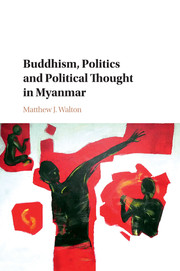Book contents
- Frontmatter
- Dedication
- Contents
- Acknowledgments
- A Note on Language and Usage
- Introduction
- 1 A Brief Political History and Cast of Characters
- 2 Building Blocks of a Moral Universe
- 3 On Human Nature and the Nature of Politics
- 4 Order and Freedom/Liberation: Purposes of Politics
- 5 What is “Politics” and What Constitutes “Participation”?
- 6 Discipline, Rights, and Morality: “Democracy” in Contemporary Myanmar
- Conclusion
- Appendix Glossary of Burmese and Buddhist Terms
- Bibliography
- Index
4 - Order and Freedom/Liberation: Purposes of Politics
Published online by Cambridge University Press: 22 December 2016
- Frontmatter
- Dedication
- Contents
- Acknowledgments
- A Note on Language and Usage
- Introduction
- 1 A Brief Political History and Cast of Characters
- 2 Building Blocks of a Moral Universe
- 3 On Human Nature and the Nature of Politics
- 4 Order and Freedom/Liberation: Purposes of Politics
- 5 What is “Politics” and What Constitutes “Participation”?
- 6 Discipline, Rights, and Morality: “Democracy” in Contemporary Myanmar
- Conclusion
- Appendix Glossary of Burmese and Buddhist Terms
- Bibliography
- Index
Summary
In the previous chapter, I argued that the conception of human nature provided by the moral universe contains two distinct perspectives on the conditions of human existence. On the one hand, being pu htu zin (Pāli puthujjana), beings intrinsically driven by desire and craving, humans are destined for lives filled with conflict, harming each other and engendering a perpetual cycle of violence. From another perspective, however, humans are capable of controlling and even overcoming their enslavement to desire, living morally worthy lives and (for a select few) stepping completely out of the cycle of suffering and continued existence (Pāli samsāra, Bur. thanthara). While it is analytically useful to separate these two perspectives, they are not mutually exclusive; in fact, the conception of human nature in the moral universe necessarily encompasses both points of view. However, when looking at Burmese Buddhist arguments regarding the end goals of politics, these twin aspects of human nature inform ideas that fall into two broad categories.
If one takes human beings to be fundamentally fallible and unable to control their desires, the purpose of politics is to create an authority that has power over human actors, managing their conflicts, punishing them when appropriate, and constraining them to act in accordance with both moral and mundane laws. I call this the argument for order, most apparent in the tale of human decline in the Aggañña Sutta. Order not only implies political control over subjects, it also refers to the proper arrangement of society according to the laws of nature, which results in balance and harmony.
The alternative end goal of politics is freedom/liberation. Although it is cumbersome to use this term, the two words have specific connotations in the Buddhist context and it is important to distinguish between them while also understanding how Burmese thinkers have connected mundane understandings of freedom to moral/spiritual freedom and liberation. “Freedom” would include a moral/spiritual understanding based on human potential to realize the overcoming of desire as well as more lawki (mundane or worldly, Pāli lokiya) understandings such as freedom from political and economic oppression or enslavement.
- Type
- Chapter
- Information
- Buddhism, Politics and Political Thought in Myanmar , pp. 96 - 126Publisher: Cambridge University PressPrint publication year: 2016

